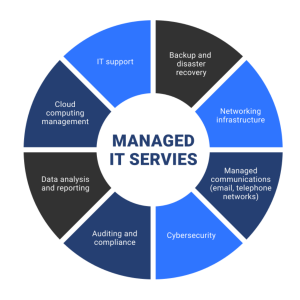Managed service providers, or MSPs, are IT service companies that offer managed services to other companies in addition to their normal business clients. But what exactly does this mean? And how can you benefit from working with an MSP? This ultimate guide to managed service providers will provide you with answers to all of these questions and more!
Who is a Managed Service Provider?

A managed service provider (MSP) is a business that provides technology support and management services to other businesses. They work with organizations both big and small, offering everything from help desk services, networking and security solutions, server management, disaster recovery services and more. The main benefit of hiring an MSP is convenience; they handle all aspects of your IT infrastructure on a monthly or annual contract basis so you don’t have to worry about managing it yourself. You also get access to experienced tech professionals who can resolve issues quickly and efficiently. This frees up your staff members to focus on their core responsibilities while still ensuring their systems are always running smoothly. When choosing an MSP, make sure they offer a wide range of services in addition to remote monitoring and troubleshooting because it will allow them to scale as your company grows. You should also look for references and past client testimonials because these will give you insight into how responsive and helpful their customer service team is.
Benefits of Using a MSP

Your business is a huge investment. Make sure you’re getting your money’s worth by using a managed service provider (MSP). Using an MSP can help ensure that your network and systems run smoothly and efficiently, freeing up your time and energy so you can focus on growing your business. Here are some of the benefits of working with an MSP:
Support the understaffed organizations. For an organization that lacks workers, it can outsource some of its tasks to the MSP.
Utilize qualified experts by hiring a reputable MSP.
Create business continuity. An SLA specifies what obligations the MSP has to the business in preparing for or recovering from a disaster.
Many managed service providers offer 24/7 network monitoring with system visibility and cloud management capabilities.
Gain greater protection. Some MSPs provide security software and awareness training.
Make your expenses more economical. When there are unforeseen repairs, it can be more efficient to pay a monthly charge rather than getting a higher hourly fee. It’s a huge time-saver for our customers as the MSP handles all of the day-to-day management for them, and their focus can be solely on developing their services.
What are the types of MSPs?

Choosing which categorizing scheme to follow will result in a list of managed service providers (MSPs) that is either comprehensive or easier to navigate. For example, if a business is interested in choosing MSPs according to how much responsibility they take on and the size of their customers, MSPs can be organized into the following categories
The term ‘pure-play MSPs’ are providers who concentrate solely on monitoring networks and application performance. They offer services of their own that concentrate on alerts and notifications.
Work with MSPs that service large mid-sized businesses and some Fortune 500 companies. Generally offer a range of services, including: monitoring, reporting, and software installation and upgrades.
Major MSPs consist of small and large providers that enable their clients to outsource as much of their IT processes as desired. Most high-level MSPs offer a diverse range of services.
Service providers (also known as MSPs) can also be categorized by the type of services they offer
In other words, they monitor software applications, network devices, servers, or websites in real time.
These managed service providers provide remote cloud-based software, support remote devices, and troubleshoot technical issues remotely.
As opposed to reactive measures, these MSPs do proactive maintenance to stay on top of any device or network troubles that may occur.
MSPs (managed service providers) who employ a centralized management system can be employed to keep your network, IT equipment, and all software current, installed, and running smoothly.
Schedule maintenance: These MSPs offer regularly scheduled network maintenance for companies.
Reduced billing. With MSPs, you will enjoy simplified invoicing, billing and budgeting through a billing management system.
Choosing the Right MSP

While there are many benefits of working with an MSP, it’s also important that you choose a provider who is right for your organization. Some questions to ask before picking an MSP include 1. What services do they offer?
- How long have they been in business?
- Are they accredited by any organizations?
- Do they provide references from previous clients?
- What kind of support will I receive after signing on with them?
- Do they specialize in specific industries or technologies?
- Will my data be secure when using their services? 8. How much will it cost me?
- Do they offer a free trial period or money-back guarantee?
- What are their payment terms like (monthly, quarterly, etc.)?
- What is their cancellation policy like if I decide not to continue with them after signing on for a contract? 12. Are they available 24/7, or do they only offer business hours support?
- Do they provide remote support services, or do I have to be at my computer in order to work with them?
- How long does it take for them to respond when you contact them about an issue or question?
- How much experience do they have working with businesses similar to mine (small-to-medium-sized organizations)?
10 Questions to Ask Potential Partners

When seeking a managed service provider (MSP), there are a few questions you should ask potential partners. Here’s a list of some of our favorites, in no particular order
- What does your company do?
- How many clients do you have?
- What type of customers do you typically work with?
- How much experience do your employees have?
- Do you offer 24/7 support? If so, how is it staffed and what is your uptime guarantee?
- What types of monitoring solutions do you use and why did you choose them over others on the market?
We at R4 Solutions, Inc. are the leaders in providing managed service across IT industries. Get in touch with our experts to know more. For starters, you can ask these questions and understand more about the possibilities of us transforming your business.

